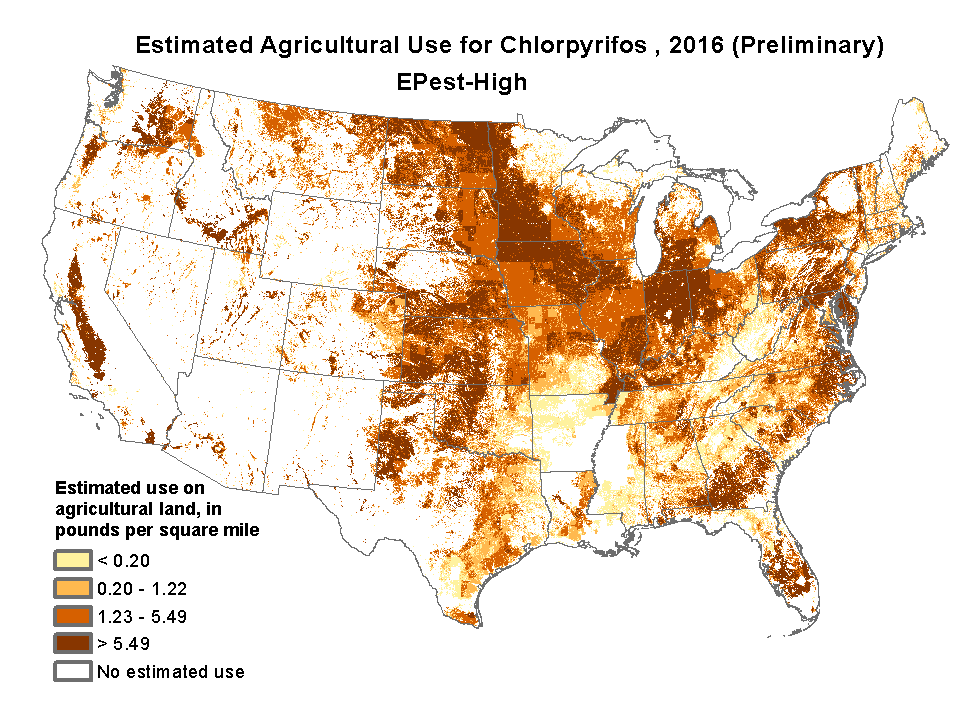Is buying organic worth the extra cost?
There isn’t a one-size-fits-all answer to that question.
Pesticides sprayed on conventionally grown foods affect people differently. Some people carry genetic variants that decrease their ability to detoxify specific pesticides, others may be more resilient.
This is Part Two in a series on pesticides.
What are organophosphates?
Organophosphates are a class of chemicals used in some pesticides. When insects are exposed to organophosphates, their acetylcholinesterase enzyme is blocked.
Acetylcholine is a neurotransmitter that sends a signal from one nerve to the next. Acetylcholinesterase is the enzyme that turns off that signal. Both are needed — and needed at the right time — for your nerves to work.
By blocking acetylcholinesterase, organophosphates cause insect nerves not to stop firing, which eventually kills the insect.
Where are organophosphates used?
Organophosphates are commonly used as insecticides on conventionally grown crops:
- Parathion (banned in most countries)
- Chlorpyrifos
- Diazinon
- Phosmet
- Malathion
Organophosphates were also used as a nerve gas during WWI and WWII. Examples of nerve gas include sarin, VX, and Novick.[ref]
Flame retardant chemicals also contain organophosphates.[ref] And organophosphate esters are also used in some food packaging.[ref]
Chlorpyrifos use commonly controls termites, mosquitoes, and roundworms and is now prohibited for indoor home use. On crops, it is used on grapes/fruits, soybeans, and corn.
The map from the USGS below shows the usage of chlorpyrifos in the US. (2016).

Chlorpyrifos is one of the most commonly used organophosphates in the US. It is used on corn, soybeans, wheat, grapes, and more. Hawaii and NY have recently banned the use of chlorpyrifos in those states due to concerns over health impacts.
Let’s take a look at some of the impacts of different organophosphates on human health…
Human Studies:
Organophosphate exposure has links to impaired attention, memory problems, and other cognitive problems. Also, links to chronic health problems such as Gulf War Syndrome, Alzheimer’s, and Parkinson’s exist.[ref]
Acute exposure to organophosphates negatively impacts the central nervous system, cardiovascular system, respiratory system, and gastrointestinal system.[ref]
If you are thinking, ‘that is pretty much everything in the body’, you are right. And acute exposure at a certain level is lethal – either through not being able to breathe or your heart shutting down… But most of us will never be exposed to acute levels of organophosphates (hopefully).
Avoiding all organophosphates is difficult, perhaps almost impossible. A study of Canadian children found organophosphate metabolites in the urine of 91% of children.[ref] Another study found organophosphate metabolites in the urine of 100% of the participants (adults, Atlanta, GA).[ref]
Long-term, low-dose exposure to organophosphates has links to:
- psychiatric problems or impaired neurobehavioral functioning[ref]
- motor neuron problems (Parkinson’s like symptoms)
- developmental neurotoxicity[ref]
- general exposure from living in agricultural areas is linked to Parkinson’s[ref]
- prenatal exposure affects cognitive development in kids, depending in part on the mom’s genotype (more below)[ref]
- another prenatal study in agricultural workers found that higher maternal OP pesticide exposure decreased their children’s IQ. The top quartile of moms exposed had a 7-point lower IQ in the kids.[ref]
- farmworkers generally show neurological effects from organophosphate exposure, such as problems with executive function, verbal, memory, or processing speed[ref]
- a study in India found that OP exposure was linked to HbA1c levels and diabetes risk — but not through acetylcholine esterase, but via the gut microbiome[ref]
- increased risk of obesity[ref]
- disrupts thyroid function (study of pregnant women)[ref]
- muscle weakness and numbness (rice farm workers)[ref]
Animal Studies:
There are numerous animal studies using various organophosphate pesticides at low and high doses. Here are the results from just a few of the recent studies:
- organophosphates modify expression in genes regulating the cell cycle and apoptosis in the brain (baby rat study)[ref]
- organophosphate exposure in early life exacerbates the risk of obesity, especially in high-fat diets (rat studies)[ref]
- chlorpyrifos has been shown to decrease intestinal integrity, which increases LPS and low-grade inflammation (in mice). This leads to obesity.[ref]
- chlorpyrifos damages sperm and decreases sperm count in rats. A high-fat diet decreased the effects.[ref]
- chlorpyrifos messes with rats’ brains — decreased neurocognitive performance and increased anxiety-like behavior.[ref]
Organophosphates Genotype Report:
Members: Log in to see your data below.
Not a member? Join here.
Why is this section is now only for members? Here’s why…
Lifehacks:
Avoiding Organophosphates:
Organic foods have low (or no) organophosphate pesticide residue. You can check the FDA data on pesticide residue for your favorite fruits and vegetables here.
Meat, fish, and dairy usually have low amounts of organophosphates.
While fruits and vegetables are generally considered to be good for you, it may be a trade-off with pesticide exposure in conventionally grown foods. A study on kids in Atlanta showed that switching out conventional fruits, vegetables, and grains for organic ones substantially reduced the number of organophosphate metabolites in their urine to almost undetectable levels.[ref]
Another study recently found that a diet that was about 80% organic reduced organophosphates in the urine by 90% after a week.[ref] The study was small (13 people), but the results do seem to point to it being possible to clear out organophosphates pretty quickly.
Related Articles and Topics:
Glyphosate: interaction with genetics
The active ingredient in RoundUp is glyphosate, and people with certain genetic variants may be more prone to problems with glyphosate.
BPA: Genetics and Detoxification
Ubiquitous in our environment, BPA is an endocrine-disrupting chemical. Some people are genetically at a disadvantage in detoxifying BPA.

